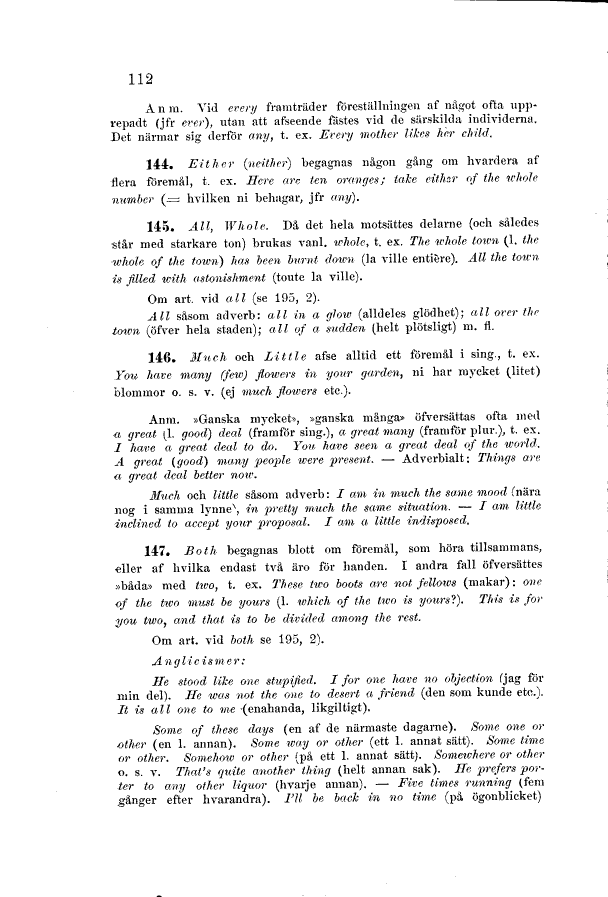
Full resolution (TIFF) - On this page / på denna sida - 4. Pronomen.

<< prev. page << föreg. sida << >> nästa sida >> next page >>
Below is the raw OCR text
from the above scanned image.
Do you see an error? Proofread the page now!
Här nedan syns maskintolkade texten från faksimilbilden ovan.
Ser du något fel? Korrekturläs sidan nu!
This page has been proofread at least once.
(diff)
(history)
Denna sida har korrekturlästs minst en gång.
(skillnad)
(historik)
112
Anm. Vid every framträder föreställningen af något ofta upprepadt
(jfr ever), utan att afseende fästes vid de särskilda individerna.
Det närmar sig derför any, t. ex. Every mother likes her child.
144. Either (neither) begagnas någon gång om hvardera af flera
föremål, t. ex. Here are ten oranges; take either of the whole
number (= hvilken ni behagar, jfr any}.
145. All, Whole. Då det hela motsättes delarne (och således
står med starkare ton) brukas vanl. whole, t. ex. The whole town
(l. the whole of the town) has been burnt down (la ville entiere).
All the town is filled with astonishment (toute la ville).
Om art. vid all (se 195, 2).
All såsom adverb: all in a glow (alldeles glödhet); all over the
town (öfver hela staden); all of a sudden (helt plötsligt) m. fl.
146. Much och little afse alltid ett föremål i sing., t. ex.
You have many (few) flowers in your garden, ni har mycket (litet)
blommor o. s. v. (ej much flowers etc.).
Anm. »Ganska mycket», »ganska många» öfversättas ofta med
a great (l. good} deal (framför sing.), a great many (framför plur.),
t. ex. I have a great deal to do. You have seen a great deal of the world.
A great (good) many people were present. - Adverbialt: Things are
a great deal better now.
Much och little såsom adverb: I am in much the same mood (nära
nog i samma lynne), in pretty much the same situation. - I am little
inclined to accept your proposal. I am a little indisposed.
147. Both begagnas blott om föremål, som höra tillsammans,
eller af hvilka endast två äro för handen. I andra fall öfversättes
»båda» med two, t. ex. These two boots are not fellows (makar): one
of the two must be yours (l. which of the two is yours?). This is for
you two, and that is to be divided among the rest.
Om art. vid both se 195, 2).
Anglicismer:
He stood like one stupified. I for one have no objection (jag för
min del). He was not the one to desert a friend (den som kunde etc.).
It is all one to me -(enahanda, likgiltigt).
Some of these days (en af de närmaste dagarne). Some one or
other (en l. annan). Some way or other (ett l. annat sätt). Some time
or other. Somehow or other (på ett l. annat sätt). Somewhere or other
o. s. v. That’s quite another thing (helt annan sak). He prefers
porter to any other liquor (hvarje annan). - Five times running (fem
gånger efter hvarandra). I’ll be back in no time (på ögonblicket)
<< prev. page << föreg. sida << >> nästa sida >> next page >>